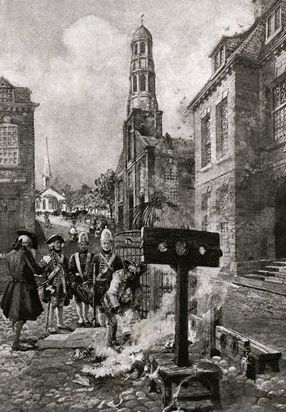Samuel Adams: political agitator, pragmatist and legend
When reading about SA, one can’t help to be amazed by his determination. Personal tragedies such as the loss of his father, his wife and his children, financial troubles and poverty over a long period of time did little to shake his spirit. Often his religious believes are credited for this amazing effect. The other more official analysis is that his views were early influenced by the writing of John Locke, the 17th century freedom philosopher. But perhaps there were other reasons. One of the early writings about SA mentions that at the beginning SA grievances with English rule in the colonies were strictly personal. The incident took place at the time when Samuel was seventeen years old - the age that can determine a persons' destiny. At that time British Parliament passed an obscure regulation that prohibited a private banking scheme and brought bankruptcy to Adams's father which inevitably affected his view of the Crown. Most likely it was not a single event that determined the course of Adam’s life but he was the product of his environment.
During this colonial period new ideas of democracy were emerging and embraced by the opposition. Imperial policy, the Stamp Act, Townshend Act and Tea taxes, all were being challenged by the opposition lead by Samuel Adams. Though he did not incite violence, he was the intellectual coordinator of the opposition movement, the Sons of Liberty. His ideas of liberty indirectly aroused pre-revolutionary attacks from Boston’s anti-loyalist mob.
Adams expressed his ideas through his writings in editorials and public speeches. He had magnificent oratory and writing skills therefore he was able to reach and inspire those around him. Samuel’s ideas were so radical at the time and against the establishment that they arouse feelings of independence among groups of residents who took to arms and became violent. He was so influential that he was called by Parliament “the most dangerous man in Massachusetts” and “the grand Incendiary”. The British considered SA a revolutionary firebrand and a political agitator who incited violence and anarchy in Boston. The attempt to capture him and John Hancock triggered the battle of Lexington, fortunately Paul Revere warned them and they escaped. In demonizing SA, the British created a legend and a revolutionary hero. According to historian Ray Raphael “Royal officials and Tories never did grasp the Revolutionaries’ distinction between “the body of the people” and a mindless mob. Because they knew no other way, they interpreted Boston’s politics as a top-down chain of command. In the process, they transformed Samuel Adams into a detestable demon. Now, we honor the mythological figure his enemies created.”
Samuel Adams considered himself a writer and a politician. He was an intellectual, a man of peace whose values were so strong that he was view as an old fashion puritan whose values were reflected in all the decisions he made. He was called “The last puritan”. He lived a simple life, he spend many years in poverty even though he could have profited from his occupation as a tax collector and business owner. His goal was to incorporate all the people of Boston to reach a genuine political revolution and eventually create their own government. Through four decades of political career, SA opposed violent acts that threatened the order of society.
The British portrayal of SA shaped the hero which with we are familiar today. Although history written about him is the account of real events, it has become transformed in meaning. And it is the power of this meaning to the American Revolution that makes this legend survive. Over time new information is uncovered and history becomes open to new interpretations but it is important to sort out the facts from the fiction to really understand the events and the role of this famous Bostonian.
|